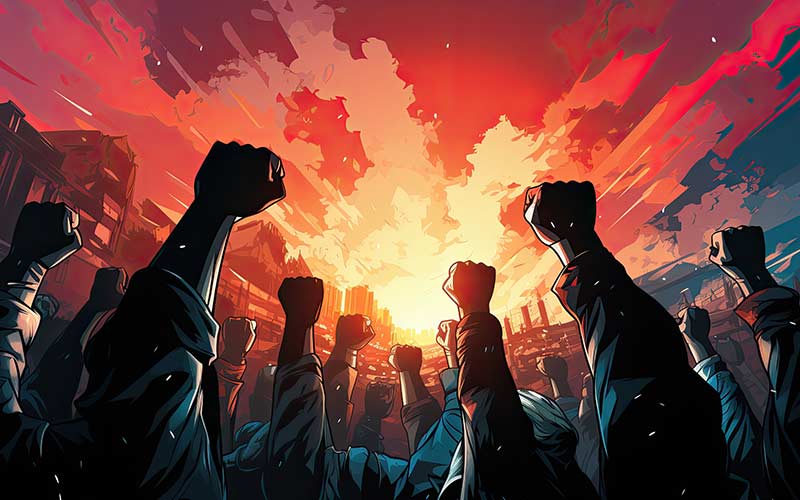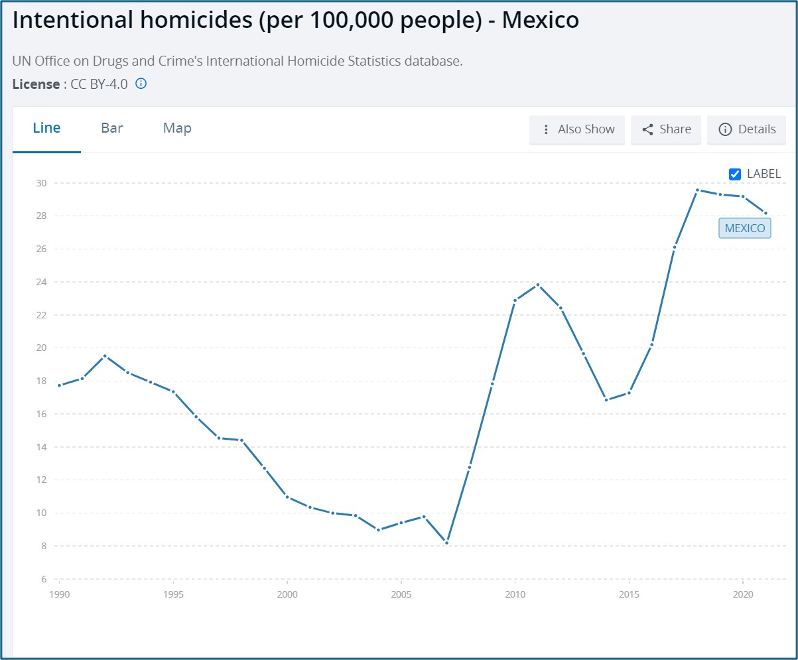
Disruptions Associated with Upcoming Elections Part 2
By TorchStone Senior Analyst, Ben West
More than half of the world’s population is scheduled to vote in elections across nearly 40 countries in 2024. Electoral politics and passionate debates tend to generate demonstrations and, occasionally, violent protest actions and targeted attacks that can threaten social stability. Elections can also shift political alignments that can push countries toward military conflict.
Protests or conflicts in the lead-up to and response to contentious elections have the potential to threaten employees, physical assets, and supply chains around the world. Tracking especially contentious upcoming election cycles taking place in 2024 can help security managers anticipate where and when employees based overseas may need more support than normal. TorchStone has identified eight election flashpoints that corporate security offices should monitor and develop response plans for in case the situation deteriorates quickly.
Part 2 of this report covers South Africa, Mexico, Moldova, and the United States.
Key Dates—Remainder of 2024
March 20, 2024: Indonesia is expected to officially announce the winner of the February elections. There is a strong precedent for disruptive protest activity leading up to and following election results in the country, with central Jakarta typically bearing the brunt of the unrest.
March 24, 2024: Senegal is experiencing an increase in protests following the outgoing president’s efforts to delay national elections that were originally scheduled for February. Additional irregularities, or unexpected outcomes, could trigger additional waves of violent unrest.
April-May 2024: India is scheduled to hold nationwide elections that have historically seen upticks in violence linked to increased protest activity, militant attacks, and politically linked violence between rivals.
May 20, 2024: Taiwan will inaugurate a new president who is staunchly opposed to Chinese efforts to gain control over Taiwan. Beijing will likely signal its opposition through potentially disruptive military, economic, or information campaigns.
May 29, 2024: South Africa faces the prospect of widespread protests and rioting if former president Jacob Zuma does not win. His supporters demonstrated their support for him during a weeks-long protest campaign in 2021 that led to widespread property damage. Additionally, local political violence is set to rise again ahead of the elections.
June 2, 2024: Mexico is already experiencing an increase in assassinations against local political candidates ahead of its scheduled elections in June. The country is set to experience its most violent year since the last round of national elections in 2018.
November 2024: Moldova will vote on a president and whether to start the process of joining the European Union, which Moscow is opposed to. As one of the few European states not protected under Western-backed security treaties, Moldova is a target for Russia’s campaign to halt the eastward expansion of pro-western countries. Russian interference, and potentially violence, are possible, if not likely, surrounding the elections.
November 5, 2024: United States elections will be a rematch between President Joe Biden and former President, Donald Trump. Their 2020 contest resulted in unprecedented levels of U.S. electoral unrest.
SOUTH AFRICA
Threats of Widespread Protests and Rioting Precede May 29 Election
Former president Jacob Zuma is seeking revenge against incumbent president Cyril Ramaphosa and challenging the ruling party while trying to avoid prison in elections scheduled for May 29. Zuma commands a large following and his supporters have threatened violence if their candidate does not win, which is a likely outcome. Following Zuma’s arrest in 2021, his supporters urged on indiscriminate protests, riots, and looting that caused widespread damage and impacted basic business operations across the country. There is concern that if Zuma does not win on May 29, his followers will organize a repeat of the 2021 riots.
Separately, and similar to Mexico, there is an established trend of settling local political disputes through violence and assassination. While violence has stayed relatively isolated in recent years, anger over the issue has the potential to spiral into tit-for-tat attacks that could be more disruptive to society in general.
• Nov 2023: Report showed that politicians are the second most targeted group for contract killings and that the province of KwaZulu-Natal is especially infamous for violence. As the 2024 election season got started, it appeared that political rivals are increasingly using violence in political disputes.
• July 2021: Supporters of former president Jacob Zuma rioted and looted across the country after he was arrested on charges of corruption. The wave of unrest damaged communication infrastructure, warehouses, blocked roads and even led to attacks against hospitals in the worst chapter of violence South Africa has experienced since the end of Apartheid.
• 2018-2022: ACLED recorded 143 incidents of violence targeting local officials, which accounted for 80% of all violence targeting government officials.
MEXICO
Violence Targeting Local Political Leaders Set to Increase This Election Year
Politically motivated violence by transnational criminal groups is likely to increase leading up to the Mexican national elections on June 2. International companies working in Mexico are no strangers to the country’s criminal threats, but election years have tended to see even bloodier campaigns by drug traffickers than usual. One public safety group had counted 30 attacks on political candidates and party officials from the start of election season in September 2023 through February 10, 2024.
As the election draws nearer, attacks are only likely to increase. Political candidates are the most vulnerable: they often do not have adequate personal protection and they are typically of more importance to drug trafficking criminal groups trying to control specific routes and markets. According to the World Bank, Mexico’s homicide rate peaked in 2018 (during the last major election cycle in Mexico) and then marginally declined through 2021—the last year of available reliable homicide figures. While the overall homicide rate remained level from 2018-2021, attacks on political leaders increased by 38% over that time period. Violence is likely to match, if not exceed, the last election cycle violence record in 2018.
• Feb 26, 2024: Two mayoral candidates in the city of Maravatio in Michoacan state were found shot dead within several hours. First, the ruling Morena party confirmed their local candidate, Miguel Ángel Zavala, was found dead from gunshot wounds in his car. Later that evening, authorities found the body of the mayoral candidate for the conservative National Action Party, Armando Pérez, similarly shot dead in his car.
• Feb 10, 2024: A mayoral candidate in the Mexico City suburb of Ecatepec was shot dead in public after receiving threats from a local union.
• Feb 7, 2024: A political coordinator for Mexico’s Citizen Movement Party in the state of Guerrero and two of his colleagues were abducted by gunmen from their car. The assailants beat them, stole their possessions, and abandoned them in a garbage dump in what appears to have been an act of intimidation.
• Jan 5, 2024: A mayoral candidate for the Institutional Revolutionary Party (PRI) in the town of Suchiate, Chiapas state was killed. In a separate incident on the same day, a mayoral candidate for the Citizen Movement party in Armeria, Colima state was shot dead in his vehicle.
MOLDOVA
Russian Threats as the Country Moves Towards EU Membership
Moldova’s intelligence service warned that Russia is seeking to destabilize the country through misinformation and hybrid attacks in an effort to disrupt Moldova’s election and referendum on joining the European Union, planned for November. In early March 2024, Moldovan Chief of Intelligence, Alexandru Musteata, said that Russia is seeking to “vilify and discredit” pro-European candidates ahead of the nationwide election. A date for the election has not been set but will likely occur around November 2024. Moldova has accused Russia of interfering in the past: In February 2023, Moldova accused Russia of backing a pro-Moscow protest movement and helping to plot a coup against the Moldovan government. Moldova’s greatest vulnerability is the breakaway region of Transnistria, a pro-Russian semi-state that hosts approximately 1,500 Russian soldiers.
While Moldova is a small country of less than 3 million people, its location between Romania and Ukraine puts it on the frontier of the NATO-Russian rivalry. While Moldova works closely with NATO and the European Union, it is not a member of either group, meaning that it is not protected under the treaty if Russia engages there militarily. While there are no indications as of March 2024 that Russia intends to engage in overt military hostilities against Moldova, it is likely to promote disinformation, support anti-government protests, and generally seek to destabilize Moldova as part of a strategy of keeping it out of Western alliance structures opposed to Moscow. Elections provide Moscow an opportunity to sow dissension and destabilize small countries like Moldova.
• Feb 1, 2024: Thousands of supporters of the Moscow-friendly Shor Party rallied outside Moldova’s parliament building in the capital, Chisinau, calling for the resignation of the pro-Western government.
• Feb 16, 2023: Moldovan authorities discovered debris from a Russian missile following a Russian military barrage on western Ukraine. It was at least the fourth time Moldova reported finding Russian missile debris on its territory. While there are no indications that the missiles targeted Moldova, the discovery of debris does contribute to general unease in the country and is a reminder of Russia’s ability to attack Moldova should it choose to do so.
• Feb 13, 2023: Moldova accused Moscow of backing anti-government protesters who were seeking to overthrow the country’s constitution and install a pro-Russia government.
UNITED STATES
Repeat of 2020 is Unlikely, But Opportunities for Unrest Leading up to November Election
The results of the previous election in 2020 led to unprecedented levels of protest activity and there is concern that the next round of general elections on November 5, 2024, could see a repeat. Protest activity leading up to and following elections is common in the United States, and some level of disruption is expected regardless of who wins. Increased security and preparedness make a repeat of the 2021 U.S. Capitol riot an unlikely scenario, but property damage and violent confrontations elsewhere are likely. In addition to the protest threat surrounding the general election, GOP presidential candidate Donald Trump faces multiple legal challenges on the state and federal level: outcomes of those trials (whether ruling in favor of or against Mr. Trump) have the potential to trigger localized and nationwide unrest.
• Nov 6, 2023: Trump supporters and opponents rallied outside the Manhattan courthouse as the former president took the stand in a lawsuit accusing Mr. Trump of inflating the value of his business assets. There were no reports of significant violence or disruptions.
• Jan 6, 2021: Hundreds of supporters of incumbent president Donald Trump tore down barricades and breached the U.S. Capitol building while Congress was validating the 2020 election results. Confrontations between protesters and security personnel led to several deaths and multiple injuries.
• Nov 11, 2016: Protests erupted in cities nationwide following Donald Trump’s election win. Some demonstrations led to property damage and clashes with police.

